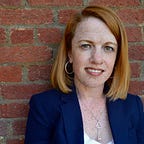Disabled Elders Pave the Road We Use Today.
The official statement is here. But I am Irish and we don’t do things, “officially.”
I rolled into the disability rights movement on the back of my godmother Ann Cupolo-Freeman’s wheelchair when I was six or seven. We’d ride up and down the streets of Berkeley, popping in to the Center for Independent Living, into the World Institute on Disability, into DREDF, watch Ann play quad rugby with the Quadzillas, and go to rallies on various issues. As a little kid I met people from the back of that chair, who would grow to become my heroes, my friends, and my colleagues. Judy was one of them.
A Champion for Section 504 of the rehab act and she didn’t hesitate to taking on Secretary Califano, when he patronized her. (forward to 11:20 for her rage.)
Famous for her participation in the documentary Crip Camp (It’s great, and should have beat a dude in love with an octopus for the Oscar), the time at Camp Jened radicalized Judy and many of the other campers. Being the majority in a space, after spending your life in the minority can do that. The modern youth movement in many ways has Judy to thank for foresight in funding youth leadership programming for young people with disabilities in California and then nationally as her final act at the Dept. of Education. These programs were the training grounds for many of us doing the work today, including myself. They brought young people with disabilities onto college campuses for a week, the first time on a campus for many, and taught disability history, exposed them to mentors and role models with disabilities, and leveled up your individual and systems advocacy skills.
She turned her focus internationally, serving with Secretary Clinton as the Senior Advisor for International Disability Rights. Where she fought tooth and nail for the United States to ratify the Convention on the Rights of People with Disabilities alongside so many others.
But beyond all the official stuff, I will miss her 7 am calls on weekends and her 11pm calls on weeknights. I will miss her loving on and spoiling my kids. I will miss her telling me that she checked in as often as she did because she knew my mom would want her to and that way she could report on me to my godmother back in California. I will miss her telling me how much she loved to see me in purple.I will miss the frequency by which she would pass my phone number to random people she would meet on Connecticut Avenue who she thought I could help.
The last thing I would want people to remember is that this is the first real generation of elders in the disability community. Those that came before them died much younger, often a in a jail or institution. And many of our elders today, like Judy, have to keep working, long after their non-disabled peers have retired. Our folks don’t have retirement plans, don’t have pension plans, because they were too busy fighting for our rights and federal policies often prohibits their ability to save money. And even if they did have pensions or 401Ks, they won’t cover their need for home care. So they can’t stop working. This is why funding for home and community based services remains a top priority for the Disability community.
